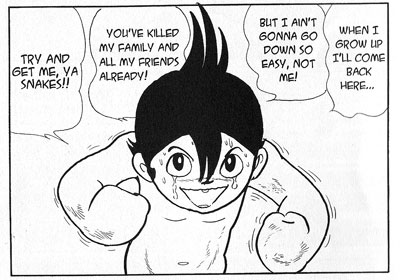
Osamu Tezuka, the father of modern manga, is revered for having inspired a pantheon of manga artists. While he was inspired by Disney animation such as Snow White & Bambi, his art was visually distinct and expressive in different ways.
His naar-cinematic technique provided a print perspective far richer than the casual artist might imaginee possible. Manga is derived from a form of illustrated story-telling called 'emonogatari', and means comic or comedic in Chinese. Manga goes beyond traditional stories by allowing the pictures themselves to 'tell the story', as it were. Thus, it is closer to film than to prose.
While most manga familiar to the Western audience is erotic or action-oriented, and known commonly in the cinematic form of anime, Japanese manga can run the gamut from educational aids, to classical tales, to science fiction. The work
Japan Inc: An Introduction to Japanese Economics by Ishinomori Shotaro is an example of the breadth of information represented in manga. Historical manga, or chanbara,(from the sound of swords clashing together) has contributed many archetypal Japanese myths to popular culture, film and even video games.
One example of historical manga, although not in the realm of swordplay, is Osamu Tezuka's Buddha Dai Ikkan
, a fictional retelling of the life of the Buddha, now available in English. This is a funny, creative book, ranging from high humor to dark pathos. Original characters, and a modern spin, particularly noticeable in the English translation provide an entertaining read.
As per one reviewer,
The story is epic in scope, but Tezuka isn't afraid to liberally sprinkle his story with humor, farce, and high comedy. In this opening volume, the "Blessed One" is born, and Tezuka ties the life of the Buddha with several of his charming original characters including the slave caste Chapra and his mother Maya, the pariah Tatta, a fat general, and a tragic young monk. Like classic Disney animated features, Buddha is a riveting drama that is as serious as it is sentimental and humorous. Tezuka, obviously, was a strong writer as evident in his solid plot structure and engaging characters.

No comments:
Post a Comment